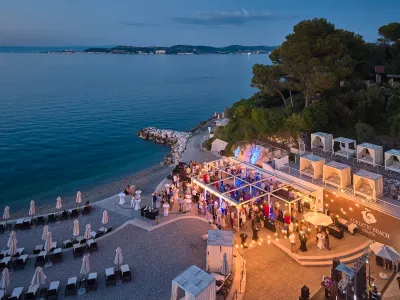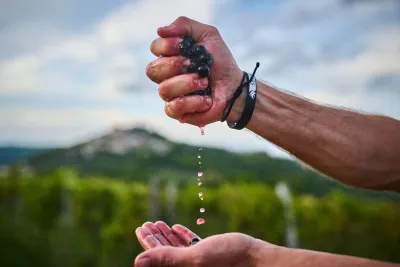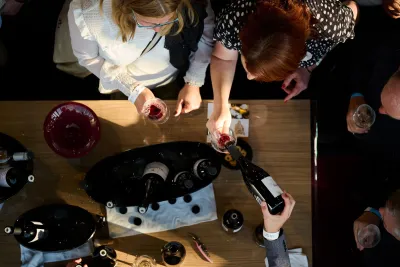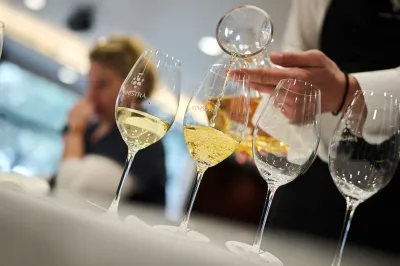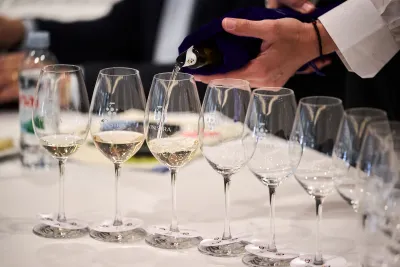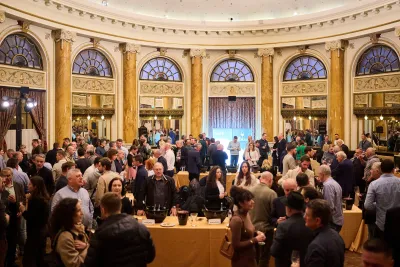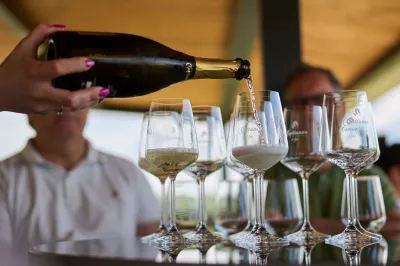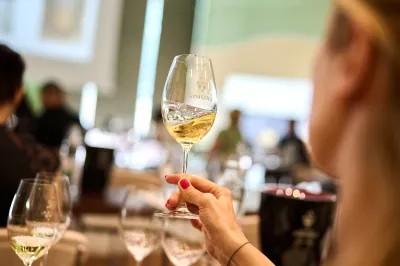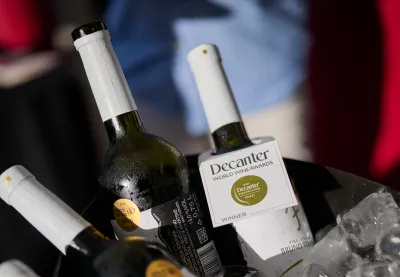Introducing the host
ISTRIA, the most dynamic wine region in Croatia
Istria - terra magica
Istria is a beautiful region of rolling hills, terraced vineyards, olive groves, and medieval hilltop villages. It’s surrounded by the Adriatic on three sides, with the Julian Alps to the north. The area is shared by three countries: Croatia, Slovenia, and Italy. Such favourable geographic position, almost at the heart of Europe, halfway between the Equator and the North Pole, Istria has always represented a bridge connecting the Middle European continental area with the Mediterranean.
The climate is sub-Mediterranean to Mediterranean, with warm summers and mild winters, so snow and winter frost damage are rare. The region tends to be breezy, with relatively low fungal pressure thanks to the winds.
Among legally protected landscape in the Istrian Region are well-known natural reservations-national park Brijuni, nature park Učka, protected landscape Limski Bay and the Motovun wood where can be finned one of the finest truffles of the world.
More than 10,000 samples from 50 different countries
The Concours Mondial de Bruxelles (CMB) is the global benchmark for wine judging. It was organized for the first time in 1994, and the specificity of this judging process is that since 2006 it has been changing its location, i.e. the region where it is held, and so far it has visited 15 different countries of the world. The European Union has officially supported the CMB organization, behind which there is independent and strict control.
Today, CMB collects and judges more than 10,000 samples from 50 different countries, and that number continues to grow. The judging process lasts 3 days and is the most influential global wine judging process in the world after Decanter, which, unlike the CMB, is organized exclusively in London.
It is organized according to the principle of independence, strict standards and wine tasting procedures that provide security to consumers, enabling them to buy medal-winning wines with absolute confidence.
The city of Poreč, an established wine mecca
The people of Istria have historical ties with grapes and wine production. Istria, and more specifically the town of Poreč, will host the main tasting session of the competition dedicated to red and white wines. The tastings will take place in the region on 12th, 13th and 14th May 2023.
The city of Poreč is located in the heart of the western coast of Istria. The most valuable cultural monument in town of Poreč is its sixth-century basilica. The Euphrasian Basilica is one of the best preserved early Christian structures and belongs to the most significant historical monuments in the world, which is why in 1997 it was inscribed on the UNESCO World Heritage List. A town of culture, tourism, sport and entertainment is an ideal stay location throughout the year.
Vinistra, more than a wine fair!
In fact, it all started here in Poreč!
Poreč is a wine mecca with many years of experience in organising the wine fair as well as a number of other festivals.
Vinistra is the most renowned regional wine event organised by the Istrian Association of Winemakers and Winegrowers, Vinistra, in cooperation with the Istrian Tourist Board, Plava Laguna hotel company and Istrian Region.
The association of winegrowers and winemakers of Istria, Vinistra, has been operating since 1994 with the main goal of improving and developing viticulture and winemaking in Istria. Today, it consists of more than 120 members from the area of Istria and Kvarner.
Wine and winemaking it's a part of Istrian tradition and have made Istria a recognisable brand on the global market.
Istrian wines
What makes Istrian wines special is a combination of factors: a mild and pleasant climate, warm summers, the proximity of the sea, which stabilizes the moisture in the air in the coastal area, and the altitude of central Istria. And of course, the quality of the soil.
Blessed with hills and a moderate climate modulated by the sea breeze and at least four types of soil (red, white, black and grey soil), Istria is ideal for wine growing. The diverse soils are additionally enriched with limestone deposits in depth, opening up possibilities for the cultivation and production of numerous varieties - red, white and rosé wines, from indigenous and globally distributed varieties to smaller quantities of sparkling and sweet wines.
Malvasia istriana
The Istrian eno-star, has been present in this region for a very long time, but it was officially mentioned for the first time at the Zagreb Wine Exhibition in 1891.
In history, it was most often labelled as Malvasia white or simply as Malvasia, while since the middle of the 20th century it has also been labelled as Istrian Malvasia, and since then it has received much more attention on the Istrian wine scene.
Istrian Malvasia belongs to the oldest varieties, such as Pinot or Gamay. Ampelographic and genetic research has established that the Istrian Malvasia differs from other varieties that bear the name Malvasia, which makes it an indigenous Istrian variety.
The basic aromas of Malvasia istriana range from mineral notes to citrus and floral notes, as well as southern fruits. The taste is rich in extract, in some Malvasia it is mild and refreshing, and in others it is fuller, stronger and more mature.
In Poreč from 11 to 14 May
Over 350 wine judges from 50 different countries of the world come to the country where the judging is organized. This is precisely the greatest value of judging, because in addition to wine tasting and judging, the wine judges have the opportunity to get to know the wine region through organized tastings, presentations, conferences and local excursions.
The wine judges are: 60% journalists, 10% sommeliers, 18% enologists, 12% traders and importers. Through the organization of accompanying programs, the wine judges get to know the destination and thus publish articles, books, media releases that are shared in all the world's relevant media. By introducing such a judging event, Istria placed itself on the world wine list and further strengthened its position at the European and world level.
CMB directly affects the tourism, as well as economic and wine sectors due to its global importance. The region in which it is organized gains marketing visibility on a global level and is a strong driver of economic and tourist importance.
The previous hosts were Aigle (Switzerland), Brno (Czech Republic) and Calabria (Italy), and it will be held in the city of Poreč from 11th to 14th of May this year.





